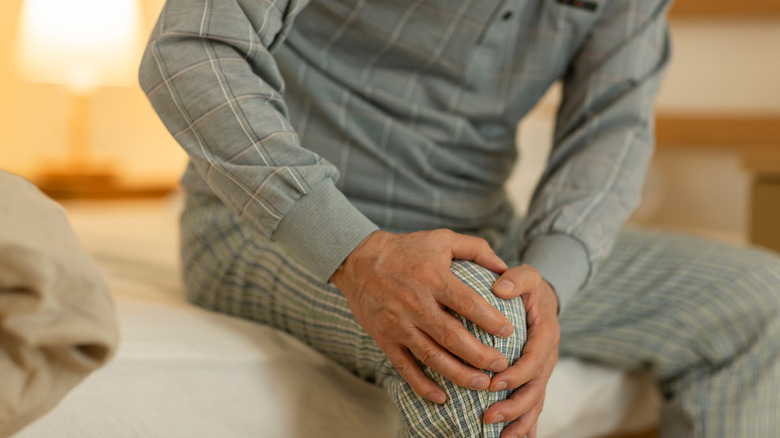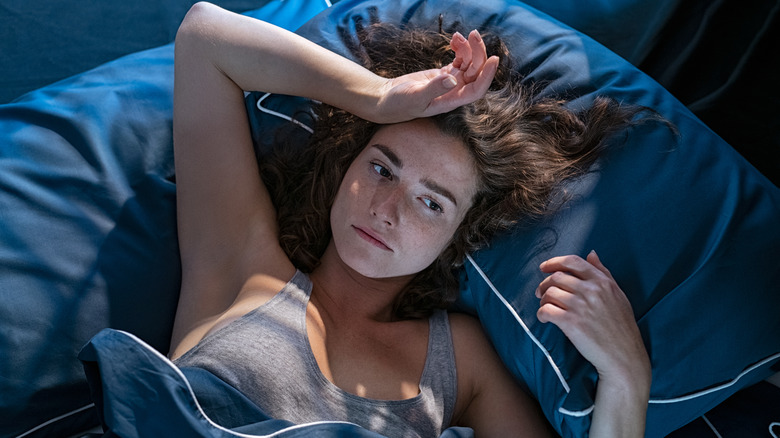Why You May Be Experiencing Throbbing Knee Pain At Night
Knee pain is typically caused by the wear and tear of joints due to daily activities, like walking, bending, and lifting (via Johns Hopkins Medicine). Since knee pain is associated with these day-to-day activities, when the pain occurs at night, knowing the cause behind it can be tricky. The condition can even become weakening making matters worse.
After all, the knee is one of the human body's largest and most sophisticated joints, consisting of the femur, tibia, patella, and more (via WebMD). In addition to these bones are numerous fluid-filled sacs that help the knee move smoothly. Keep in mind, the knee's complex nature makes it vulnerable to various injuries even though it's vital for movement (via Medical News Today). Symptoms such as swelling, stiffness, redness, weakness, or loud popping noises may accompany knee pains, according to the Mayo Clinic. However, these symptoms may also vary in severity depending on the cause of the problem.
The elusiveness of symptoms coupled with the knee's sophisticated nature can make it difficult to determine why you may be experiencing throbbing knee pain throughout the night.
The reasons behind the pain
There are several factors that can aggravate your knee pain at night. Keep in mind, you're unlikely to experience knee pain at night if your knee is healthy, according to the Cleveland Clinic. For people who do though, osteoarthritis, which is caused by wear and tear of the joints, might be the reason behind the pain. Generally speaking, knee pain usually worsens at night due to decreased activity, which also decreases lubrication. Therefore, the more you move, the more lubricated your joints are.
Another interesting explanation could be that you're less distracted by everything else at night, causing you to focus more on the pain and the discomfort. Turns out, the same cause is reiterated by the results of a six-month data collection exercise conducted in a 2020 article published in Rheumatology. The exercise found that people often searched for pain management information between the hours of 11 p.m. and 4 a.m.
Additionally, some natural body processes can also trigger knee pain at night. According to Medical News Today, people with rheumatoid arthritis, for example, release less cortisol, an anti-inflammatory chemical, during the night, worsening inflammation-related pain. Plus, the release of inflammatory cytokines can also cause more discomfort due to more cells settling in the inflamed tissue. Other possible causes of knee pain include insomnia, consuming caffeine before bedtime, or the mattress and pillow pressuring your joints.
Tips to relieve knee pain at night
Treatment for knee pain usually begins with a physical examination of your knee, which may include a CT or MRI scan (via Johns Hopkins Medicine). After a diagnosis is confirmed, your doctor may recommend over-the-counter prescription painkillers, like acetaminophen, ibuprofen, or naproxen (via WebMD). Your doctor might also recommend an exercise program to help strengthen the muscles around the knee, increasing its stability.
If your knee pain is severe, an injection can be given directly into the knee joint, says Mayo Clinic. Injectable medications usually include corticosteroids, hyaluronic acid, and platelet-rich plasma (PRP), which may benefit certain people with osteoarthritis. Corticosteroid injections can help reduce flare-ups in people with arthritis for a few months but aren't for everyone. Hyaluronic acid injections, on the other hand, are made up of a thick fluid that naturally lubricates the joints and eases pain, which usually lasts for about six months.
In some cases, surgery might suffice if nothing else relieves your knee pain. Your doctor can recommend a knee replacement surgery, especially if the pains become severe to the point where it affects your mobility and quality of life, per Healthline. However, if you experience pain in only one area of the knee, an osteotomy may be better suited, explains the Cleveland Clinic. An arthroscopy is another minimally invasive surgical procedure, which involves inserting a small camera into the knee joints to guide tiny surgical instruments (via the American Academy of Orthopaedic Surgeons).



